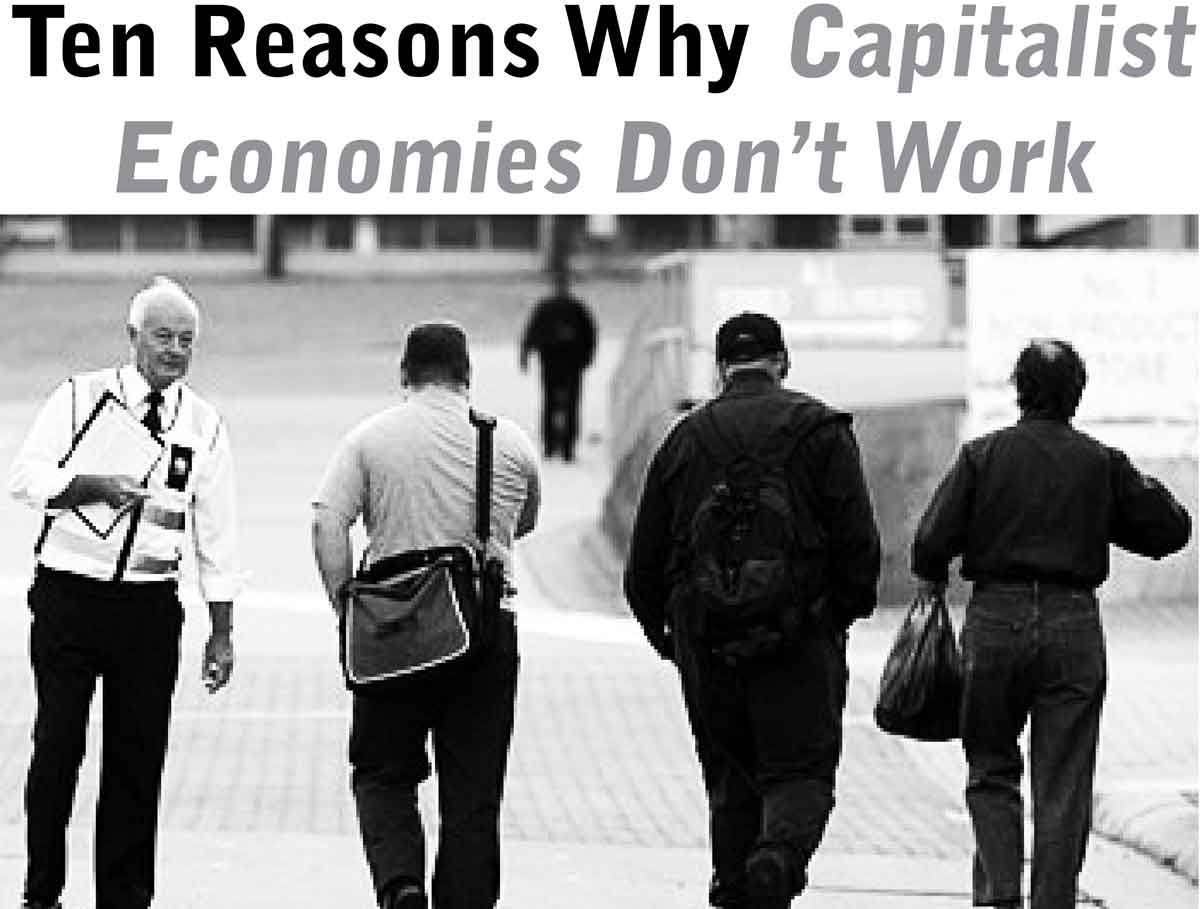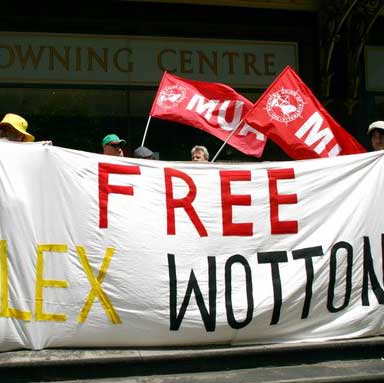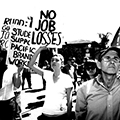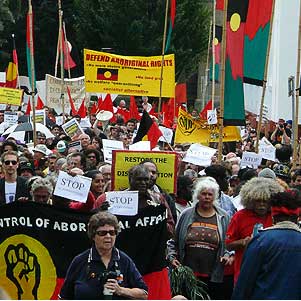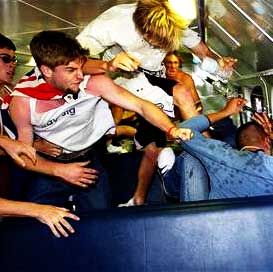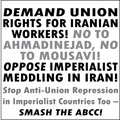Mitsubishi workers on the day in February 2008 they were told their Tonsley Park plant in Adelaide would be closed down, leaving more than 1200 workers out of a job: 930 jobs lost from the plant itself and an estimated 280 in associated component supplier companies.
More and more, people see the inequalities created by capitalism. Here in Australia, low-paid or casual workers struggle to pay rent while James Packer enjoys billions of dollars of inherited wealth. Hard-working employees who have toiled away in particular jobs for decades are threatened with lay offs while mining tycoon Andrew Forest sits on a massive fortune that he acquired through stock market speculation.
In India a survey conducted in 2005 found that 47% of children under the age of three are underweight due to malnourishment. Yet India’s richest man Mukesh Ambani is now building a two billion (U.S.) dollar family home consisting of 27 storeys, silver stairway railings and six levels of parking to accommodate a private fleet of 168 cars.
Such grotesque inequalities within countries like India are part of the reason for the mass poverty in those lands. But it is not the only reason. In countries such as India, Indonesia, Thailand, Philippines and Mexico much of the wealth produced is stolen by the heads of corporations based in the U.S., Britain, Australia, France, Japan etc. These “First World” bosses make huge profits in “Third World” countries by exploiting underpaid labour, by grabbing hold of natural resources and by controlling markets. They are assisted in these greedy endeavours by their home governments in Washington, London, Canberra and Paris. Such governments impose “free market” policies on poorer countries by threatening or undertaking military interventions and by fostering political puppets within the poorer countries. All of this retards the development of the “developing world.”
But the ideologues of capitalism tell us not to worry too much about this inequality – both between rich and poor within a country and between rich and poor countries – because they say capitalism will develop the economy. They say that, despite all the suffering it is causing, this system will eventually improve people’s living standards. But with the ravage caused by today’s global capitalist crisis such a pitch is becoming a little hard to sell. The truth is that the capitalist system is incapable of ensuring consistent economic progress. Even on the level argued by its promoters, the system simply does not work. Here are ten reasons why:
- The destruction caused by boom and bust cycles.
Under the current system decisions about what to produce and what not to produce are made by the owners of private enterprises. These individual owners base their decisions solely upon what brings them the most profit.
In times of boom the competing bosses increase their future production capacity by investing in new plants. They chase more megabucks. But all of their respective rivals are also chasing the same megabucks, the same market. Eventually, no capitalist acquires the amount of market share that they planned for. They’ve all ended up with more capacity to produce but not enough people who can afford to buy this increased production at the prices that they want to sell at. High-tech machines then lie idle and new buildings become dominated by unoccupied space.
So what do the profiteers do next? They cut back. Cut back their equipment, cut back their costs and they cut back workers’ jobs. That is, they cause a recession.
A recession is, indeed, a very irrational phenomenon. New factories, depots, warehouses and service centres that weren’t too long ago constructed are now, curiously enough, dismantled … sometimes by the very same people who built them! The labour of many people becomes dedicated not to producing but to “decommissioning,” i.e. destroying the previously built capacity to produce.
In March 2008 when Mitsubishi closed its Adelaide car assembly plant not only were 500 workers cruelly sacked but another 430 employees were retained for a further 12 months just to “decommission” the plant. No doubt many of them had previously toiled over building up, upgrading and perfecting the plant.
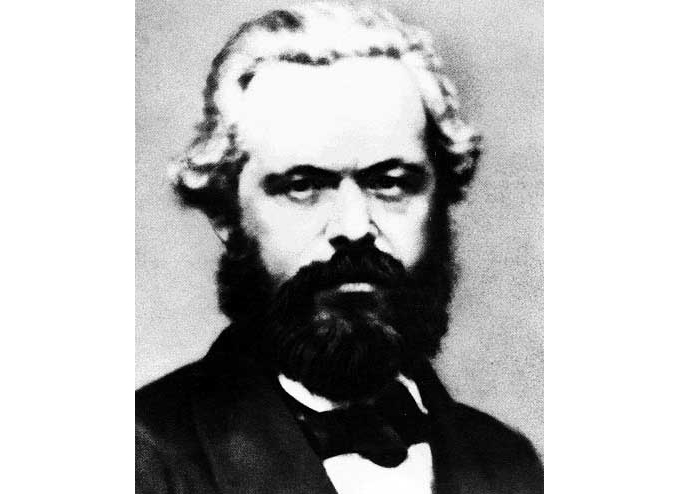
Karl Marx (1818-1883) explained how capitalism inevitably leads to crisis. He also explained how the advance of capitalist industry by bringing together workers into large workplaces, “replaces the isolation of labourers, due to competition, by their revolutionary combination due to association ... What the bourgeoisie, therefore, produces, above all, are its own grave-diggers. Its fall and victory of the proletariat are equally inevitable.”(The Communist Manifesto, 1847)
- Underused equipment
Even in times of boom (and especially in times of recession) there is a lot of equipment, buildings and instruments that are not used as much as they could be. Why? Because to fully use this physical capacity would require employers to hire and train more new staff. And to be able to sell the additionally produced good or service, the businessmen would have to lower his sale price. But at a certain point training new staff and selling things at a cheaper price costs the businessman more than the added revenue that it brings him from selling more produce. In other words, increasing production starts to eat into profits. And profits are what matters to the private enterprise boss. The capitalist is not about to miss out on his new Ferrari or private jet just for the sake of increasing production.
What does all this mean for society as a whole? Well, it means that there is both productive equipment that sometimes lies idle and people who are willing to work this equipment who also sit idle (and are then subsequently forced to stand in the dole queue.) Meanwhile, desperate low-income people miss out on the clothes, blankets, rail services, dishwashers and CDs that could so easily have been produced for them, if only the available labour were employed and trained.
- Ridiculous duplication
Departing Sydney for another capital city is a half-filled aircraft. Moments later another half-filled aircraft also leaves the airport for the same destination as the earlier departure. Only the second flight is from a rival airline to the first one. The division of the airline industry into rival carriers means a heck of a lot of wasted fuel and a whole a lot of duplication in ticketing systems, terminal buildings, computer networks etc. A similar story could be told about banking, telecommunications, cardboard manufacturing, oil/gas and indeed most other industries.
An “alternative” to such duplication is to have a monopoly. But under capitalism we know what that means - rip-off prices, shoddy products and bad service.
In the last few decades many monopolies have been split up into competing corporations. But what has driven these break ups is not primarily a wish to avoid the harm caused by monopolies but rather a drive by the monopoly capitalists themselves to divide and conquer pro-union workforces. In many enterprises with large workforces workers can truly feel their collective power and are able to build strong union organization to defend their rights. So, to counteract this, the bosses divide up their own companies. In doing so they hope to divide workers’ collective strength. They hope that workers at each of the now smaller enterprises will feel that they have separate interests from those of their former co-workers in sister firms.
Such division of companies is of course illogical from a technical point of view. The various electricity retailers and phone service providers, for example, must now duplicate many of the systems that had previously been the domain of the sole company in each of their respective industries. But the ultimate goal of the capitalists is not efficiency but, rather, profit. And to achieve more profit they need to make workers work more for lower wages. To be able to get way with this they need to curb trade union organising. If that requires the ridiculous division of companies then the greedy bosses are quite prepared to do this.
A similar motive lies behind the outsourcing and contracting out of many jobs by large firms over the last few decades. Today, in Australia, there are many tradies, courier drivers and cleaners “working for themselves” as individual contractors or subcontractors. They are isolated from each other and vulnerable to exploitation - especially in bad times. In comparison with wage workers who toil together in large numbers at a particular enterprise, individual contractors are more easily forced to accept low payment, difficult hours and work on call. This is why the corporate heads are so obsessed with pushing outsourcing. No matter that each contractor/subcontractor will now have to have his own set of tools or courier vehicle etc; or that individual contracting makes it near impossible for knowledge and skills to be shared between different people doing the same type of work. No matter, because the mad drive for profit is what rules in capitalist societies!
- Built to fail
Under capitalism, for an individual entrepreneur to make money they don’t necessarily have to have a good product to sell. They just have to have a product that looks like its good. This reaches bizarre proportions when it comes to certain products that are durables – or rather products that should be durable. In this case profit-driven manufacturers have a problem: if the item does not break down people won’t buy new items. So they make sure the product has only a limited life span. “Planned obsolescence” – the car industry is famous for this.
- Resources squandered on marketing and financial battles
When you think about it you cannot but be astounded by how many resources – both human and material – are actually spent by firms not on actual production but on trying to make sure their owners make money as opposed to their market rivals. There is, for example, all the energy spent on advertising. Then there are all the marketing efforts that go far beyond the simple task of informing people of available products. There are people hired to be call centre workers or door-knockers for the purpose of making you change your phone company. Then there are those employed to get you to transfer your credit card debt from one leaching bank to another leaching bank.
Of course, the blame cannot in any way be put on those employed in these tasks. But the way the system is set up means that these people do work that actually provides no net benefit to society – their toil only helps particular capitalists eke out more profits as opposed to their respective rivals. The same goes for certain layers of well-paid professionals: brokers, fund managers, company lawyers, market analysts, tax consultants etc. As well as serving competing companies, these types of so-called professions also engage in trying to “leverage” the wealth of upper-middle class (as well as, of course, upper class) individuals. But these efforts again produce no net benefit to society as a whole. Their work only helps some people get richer at the expense of others like an all too real game of Monopoly.
In a rational society, on the other hand, many of the above types of occupations may either not exist at all or would play a much smaller role than they do today. Then the best minds and the best-educated individuals can engage in work that actually contributes to meeting people’s and society’s needs.

One of the Global Solutions Ltd (GSL - now rebranded as G4S) security guards, flanked by WA police officers, responsible for the death-in-custody of Ngaanyatjarra Aboriginal elder “Ribs” Ward. On January 27 last year during a 3½-hour journey between Laverton and Kalgoorlie, with temperatures soaring to 42°C and with no working air-conditioner to control the heat in the back of a clapped-out Corrective Services van, Ward effectively cooked to death, his organs unable to cope in the 50°C heat inside the van. GSL is the world’s largest private security firm and has a $25 million contract for court security and transporting prisoners across Western Australia using Corrective Services equipment and facilities. In addition, it is currently contracted to provide security at all of Australia’s immigration detention centres, including the one at Christmas Island.
- The hoarding of knowledge
Every day millions around the world work at making new innovations. But often many are repeating exactly the same research as millions of others. This is because they are not exactly aware of what others are doing in their respective fields of research. In the profit-driven system each of the companies doing development work, every owner of a laboratory or workshop is obsessed at beating their rivals to potentially lucrative breakthroughs. As a result they make sure that the details of their research are well hidden.
Typically, in research for every step forward there are hundreds of steps backward. But without all the different ideas being tried out we could not get to the correct method that works. Yet, is it not crazy that so many people must have to struggle along research paths that many others have already found are a dead end? That partial steps forward are not in a timely way made widely known so that development work can be properly coordinated? The furious scramble that is research under capitalism holds back, for example, the cooperative development of energy-efficient car engines. Even more catastrophically, it is also retarding the discovery of cures for deadly diseases such as AIDS.
Even after important discoveries are eventually made, the potential benefits arising from such progress are not made fully available to everyone that needs them. Today, hundreds of millions of people in the “Third World” are made to suffer because pharmaceutical companies, brandishing their “intellectual property rights” refuse to allow others to make and sell vital medicines at affordable prices. They patent such medicines so that they can keep all of the derived profits for themselves regardless of the human cost involved.
Meanwhile, many engineering, number-crunching and design software programs that could improve products and make peoples lives’ easier are criminally underutilized. To widely disseminate these programs would cost almost nothing. But the profit-driven economic system ensures that such software is often so highly priced that many enterprises and individuals for whom they could be of use cannot gain access to them.
- Poor education
For people to be efficient producers they must be well educated. That’s just plain A-B-C. This fact is even, albeit to a partial degree, recognized by the capitalists themselves. From their point of view, if the masses are better educated then they, the capitalists, will be able to extract more profits from their workers’ mental and physical labour. Yet the stark reality is that the capitalists baulk at ensuring a properly educated population. This is the case for at least four reasons.
Firstly, although capitalist bosses recognize the need for an educated workforce none of them really want to give away too much of their own wealth to pay into public coffers the money needed to fund such education. That is why, for example, tertiary education in Australia is so badly underfunded. Nowadays, in fact, it has even largely become a “user pays” system leaving many degree holders with a massive debt at the end of their tertiary studies.
Secondly, the ruling class wants their own children to have a leg up on other kids by gaining a special, privileged education. That is why they ensure that rich private schools continue to be massively funded while public schools are squeezed dry.
Thirdly, the exploiting elite really buys their own warped propaganda that they are more capable and diligent than others. Hence, they think that the working class masses don’t really have much creative potential beyond the labour that workers already do – and therefore think that workers don’t need too much education after all.
Fourthly, the capitalist class is frightened of the consequences of too broadly educating the masses. They understand and are frightened that a highly literate working class is better equipped to challenge capitalist rule.
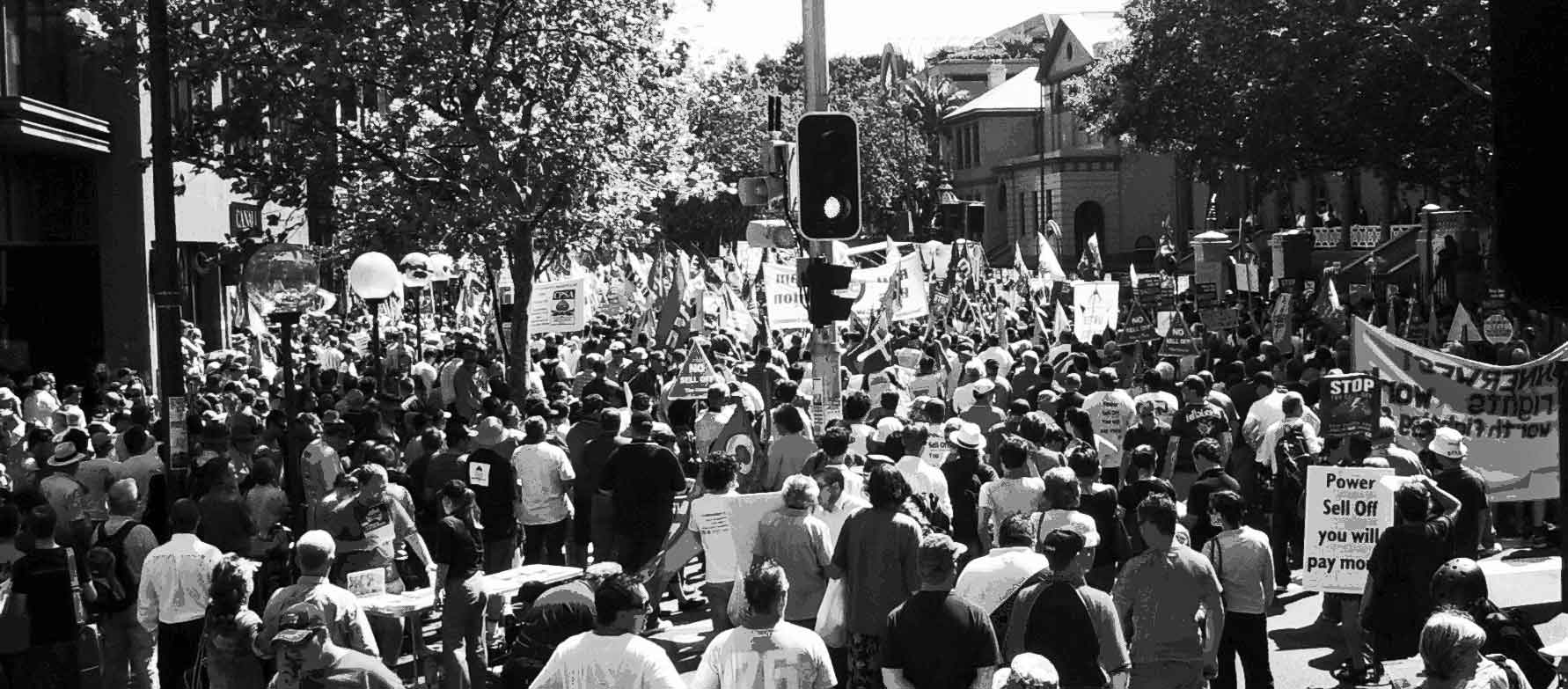
26 February 2008: Thousands of workers rally in Sydney against electricity privatisation
- Workers alienated from their products
Apologists for capitalism argue that the system gives people an “incentive to work hard.” But this “incentive” is genuinely only there for the capitalists themselves and for middle class layers who think they have a whiff of making it into the upper class. Most workers, especially those who have been in the workforce for a few years, know that there is little hope of making it big time in this society.
The one incentive that does drive workers under capitalism is the necessity to not lose their job and be thrown onto the scrapheap. That imperative, indeed, does force many workers to toil hard or, at least, to look like they are working hard (just like the capitalist businessmen must look like they are producing good products.) But when the fruits of workers’ labour are being stolen by their employers how can workers pour their hearts into their job? And what incentive is there for workers to nourish production methods with their own ingenuity? When workers do make an innovation, typically, not just the material benefits but even the moral credit for such advances are stolen from them with ambitious managers usually taking the credit.
- The cost of maintaining inequality
Every week seems to bring a new announcement of workers in the manufacturing sector having their jobs axed. At Goodyear Tyres, at Ford, at Kenworth Trucks, Pacific Brands, Zeiss and so many more. In NSW rail workers have the threat of mass sackings hanging over their head. Yet the ruling class has been hiring more and more police. The contrast between attacking workers rights on the one hand and recruiting more cops on the other is not accidental. The more the masses are made to suffer, the more that the repressive organs of the ruling class – the police, ASIO, prisons etc – are built up to enforce this unjust status quo. These capitalist state organs will be even further beefed up when the exploited and oppressed increase their resistance.
Alongside the growth of official state organs also comes the increasing numbers hired in private security to keep the homeless out of shopping centres, to stop petty theft by the desperate and most significantly to intimidate any strong workers’ struggles such as picket lines. All this policing chews up a considerable amount of society’s human and material resources. While the rail network deteriorates and waiting queues at public hospitals lengthen, the police and other security personnel receive no shortage of extra equipment. New armoured vehicles, water cannons, tasers, closed circuit televisions, anything the ruling class deems necessary to control the masses. The more power that is handed to these “private” and “public” watchdogs of the capitalist order, the more pathological becomes their brutality to a point of sadistic cruelty that no one is ultimately really safe from. In Brisbane, for instance, during the recent trial of the controversial taser weapon a 16-year-old girl weighing less than 50kg was held down by two security guards while a cop proceeded to taser her in the thigh, delivering 50,000 volts because “she had defied an order to move on” while “waiting for an ambulance to treat her sick [unconscious] friend.” (The Australian, March 5 2009)
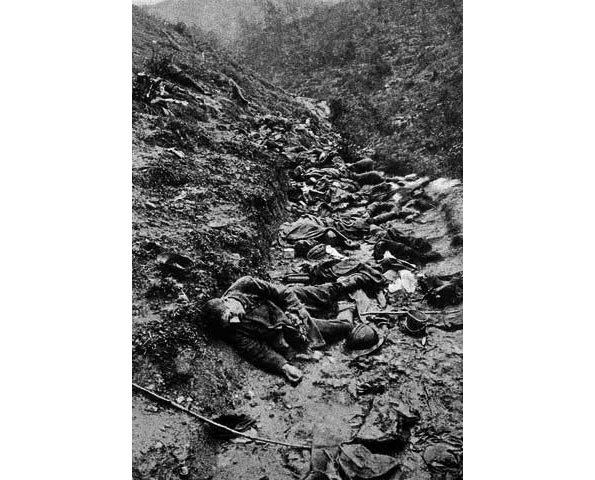
The horror of World War 1: capitalism eventually leads to such unimaginable tragedies as the world’s imperialist powers compete over domination of the world’s resources and the spoils of colonialism.
- Wars for profits
The price that is paid for maintaining unequal capitalist societies at home is matched by the cost of enforcing a world order where poor, former colonised countries are terribly subjugated. For example, in order for Australian mining giants to be able to plunder East Timor’s oil wealth, an expensive expedition by Australian troops and cops has been maintained in Timor. Then there is, of course, the massive government revenue that the U.S., Britain, Australia and others have spent on invading and occupying Iraq and Afghanistan. And what about the terrible human cost to the people of those occupied countries and the devastation to their homes and workplaces?
Yet the destruction caused by imperialist countries occupying poor countries will be dwarfed by the even more horrific consequences of a war between rival rich capitalist powers. Like World War I and World War II. The “First World” capitalist rulers cause such wars because they quarrel among themselves over who has the “right” to exploit “Third World” countries. Such squabbles are inevitable because these imperialists must exploit more and more outside their own countries in order to make up for the troubles of their faltering systems at home.
In preparation for such global conflict, capitalist powers devote a greater and greater amount of personnel, factories, land and research into building up their military capabilities. This increased development and production of tanks, submarines, frigates and fighter jets may even show up in economic growth figures. But their growing production is hardly a sign that life is becoming more comfortable for the masses!
The truth is that the capitalist system has for a long time been incapable of consistently developing economic benefits for the masses. The idea that capitalism is a necessary evil to spur on economic growth is false. It is just a notion that has been promoted by the rich ruling classes in order to justify a system that allows them a grotesquely privileged position exploiting workers’ labour both here and abroad and wasting valuable resources both industrial and natural.
Fortunately, the capitalist construction of large enterprises where lots of workers toil together has unintentionally brought the exploited the chance to organize against their common suffering. A chance to, in the first place, organise united resistance to their own exploitation by workplace owners. And eventually the chance to organise society-wide to collectively take over ownership of all the factories, mines, infrastructure, banks and land. Then all these material means of production as well as workers’ labour can in a planned way be deployed to meet everybody’s needs, instead of being chaotically fired off in the course of a frenzied scramble for profits for only a few.
A socialist, planned economy will not only open the way for all the world’s people to finally meet their basic material needs but will also nourish the joyous flowering of the, hitherto sapped, technological and cultural creativity of the masses. And by organising the economy to collectively meet everyone’s needs, it will unite the people in a society of human kindness rather than tearing us apart with wars for profits, racism and desperate competition for scarce jobs.
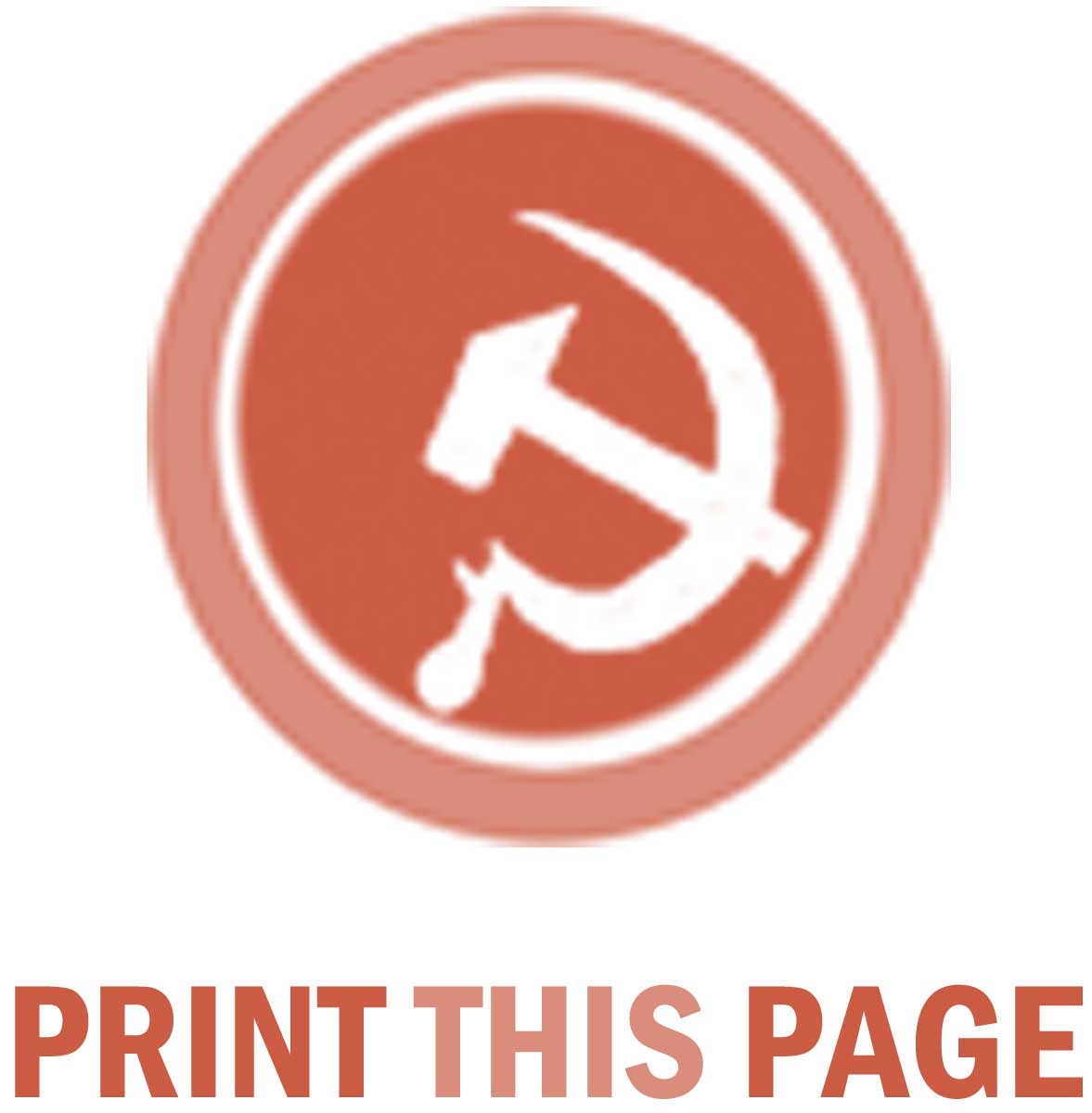

Trotskyist Platform: PO Box 1101, Fairfield NSW 1860, Australia.
E-mail: trotskyistplatform@gmail.com
Phone (Australia): 0417 204 611
Phone (International):0061 417 204 611
